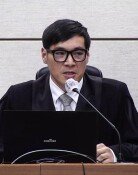Disclosure of war crime in Vietman
Disclosure of war crime in Vietman
Posted July. 14, 2000 11:45,
A 31 year-old court ruling sentencing a platoon leader to life behind bars, for the massacre of Vietnamese civilians during the Vietnam War, has come to light.
The revelation makes this the first and only legal acknowledgement through a court ruling of such incidences of civilian massacre by men of the Korean Army. Even recently, the Ministry of National Defense has adamantly denied even a knowledge of civilian massacre, "We have searched through our documents pertaining to the Vietnam War, but we have not found any incidence of civilian massacre by our soldiers."
However, the defendant, who was pardoned in 1988, has come forth and claimed that he was a victim of government conspiracy and cover-up and that the case be re-opened to find a true justice.
Many expect heated debates and discussions in this matter both domestically and internationally.
According to the spokesmen for the Korean Bar Association (KBA) and the Korean Supreme Court, the sentencing took place on April 29, 1969, upon the defendant belonging to the Korean Army serving as a platoon leader, Kim Jong-Su, for murder, disobedience, falsifying reports, plundering and other offenses.
According to the court records, Kim led his platoon on July 15 of 1968 to a destination other than the one he was commanded to secure, to lie in ambush. On the following afternoon, about 1 P.M., seven Vietnamese civilians were captured by the platoon.
With the full knowledge of their civilian status, Kim ordered his platoon to search the seven Vietnamese and looted them of their watches and shoes.
The court records further revealed that the platoon killed one Vietnamese as he attempted to escape, and for the purpose of covering up their crime, they forced the prisoners to the point of ambush in accordance with the original order by their superior officer. There, they planned to recreate a successful ambush against the enemy, the Vietcong. However, during the transport, two of the prisoners made successful escapes and the remaining men were killed.
Kim was placed under arrest to face the charges by the military judiciary on July 16, 1968. In the first court proceedings held for court-martial, he was sentenced with capital punishment. In February of the following year, the sentence was reduced to life behind bars by the higher court within the Ministry of National Defense, and the lesser sentence was upheld by the Supreme Court.
While meeting out his sentence, Kim`s sentence was reduced to 20 years imprisonment in December of 1978 followed by a conditional parole in 1983. Then in 1988, he was pardoned for his crimes.
However, in spring of this year, Kim came forward with accusation that the army prosecution of his arrest and the Supreme Court ruling were wrongful and a renewed investigation into the matter was necessary.
The KBA has since appointed a fact-finding committee which has conducted its own investigation and have submitted its finding in a report on the 13th.
Ahn Bung-Ryong, J.D., a member of the fact-finding committee stated, "Although we have searched through the court records of the three proceedings and have met with involved with the case, we found it difficult to fully grasp all the facts of the case."
He further commented, "While Kim`s request for re-trial is understandable, there really isn`t any legal footing to overturn the verdict nor any counter-evidence which could be introduced during the retrial. As such, we really cannot help him."
As for the court ruling`s 31-year in hiding, Ahn Byung-Ryong hypothesized that perhaps it may have had to do with the workings of the former president Park Jung-Hee Administration`s wish to keep the the case a classified matter.
In the case of United States, the question of attacks on the civilian during the Vietnam War by American soldiers became an issue during the 70s and a fact-finding mission was formed in 1971. The fact-finding mission unveiled what was known as the "Massacre at My Lai".
The incident involved a massacre of 173 civilians in a village, My Lai, in 1968. For the massacre, First Lieutenant William Kelley of the Charlie Company belonging to the 11th Division of the Infantry was sentenced to a life-term and the Major General Samuel Cox who was the commander of the division faced disciplinary action.
In the United States, the matter of civilian massacre during the Vietnam War still remains high on the list of issues to be resolved, and voices of criticism continue unabaited.






![“설거지해도 그대로”…냄비 ‘무지개 얼룩’ 5분 해결법 [알쓸톡]](https://dimg.donga.com/c/138/175/90/1/wps/NEWS/IMAGE/2026/01/15/133164664.3.png)
